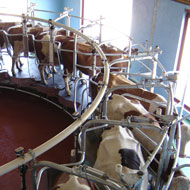
Distribution stopped pending outcome of investigations
Vets are being urged to report any adverse events associated with Velactis to the Veterinary Medicines Directorate (VMD).
The call follows a number of serious adverse events, predominantly occurring in Denmark, involving recumbency and some deaths.
CEVA Sante Animale has decided to stop further distribution of the product in Europe, pending the outcome of investigations.
In a statement, the VMD said that they are working with the European Medicines Agency, CEVA Sante Animale, and other agencies throughout Europe to closely monitor the situation.
‘We would also like to highlight that due to the nature and use of the product there is no risk to human health or consumer safety,’ it read.
‘Vets and dairy farmers are strongly encouraged to report any adverse events associated with use of Velactis to the VMD using our online reporting form or directly to CEVA Sante Animale for further investigation by the MAH as necessary.’
Velactis is a prescription only veterinary medicine that contains the active substance cabergoline. It is used in the herd management of dairy cows as an aid in abrupt drying-off, by reducing milk production.
According to the VMD, most adverse events occurred within eight to 24 hours following product administration.
‘Anecdotal evidence suggests that hypocalcaemia treatments may be successful in reversing clinical signs,’ they add.



 The Animal and Plant Health Agency (APHA) has updated its online reporting service for dead wild birds.
The Animal and Plant Health Agency (APHA) has updated its online reporting service for dead wild birds.